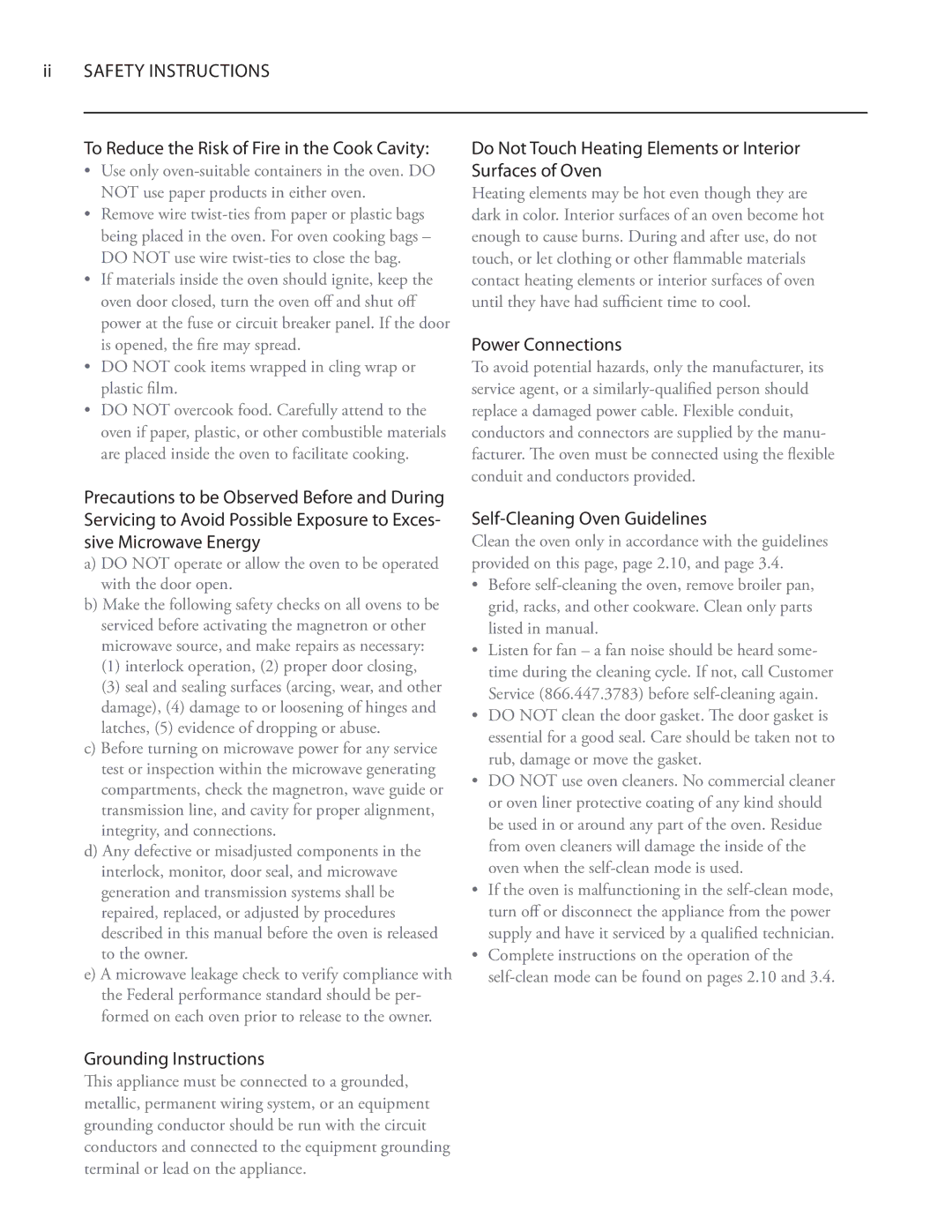ii SAFETY INSTRUCTIONS
To Reduce the Risk of Fire in the Cook Cavity: | Do Not Touch Heating Elements or Interior |
• Use only | Surfaces of Oven |
NOT use paper products in either oven. | Heating elements may be hot even though they are |
• Remove wire | dark in color. Interior surfaces of an oven become hot |
being placed in the oven. For oven cooking bags – | enough to cause burns. During and after use, do not |
DO NOT use wire | touch, or let clothing or other flammable materials |
• If materials inside the oven should ignite, keep the | contact heating elements or interior surfaces of oven |
oven door closed, turn the oven off and shut off | until they have had sufficient time to cool. |
power at the fuse or circuit breaker panel. If the door | Power Connections |
is opened, the fire may spread. | |
• DO NOT cook items wrapped in cling wrap or | To avoid potential hazards, only the manufacturer, its |
plastic film. | service agent, or a |
• DO NOT overcook food. Carefully attend to the | replace a damaged power cable. Flexible conduit, |
oven if paper, plastic, or other combustible materials | conductors and connectors are supplied by the manu- |
are placed inside the oven to facilitate cooking. | facturer. The oven must be connected using the flexible |
| conduit and conductors provided. |
Precautions to be Observed Before and During Servicing to Avoid Possible Exposure to Exces- sive Microwave Energy
a)DO NOT operate or allow the oven to be operated with the door open.
b)Make the following safety checks on all ovens to be serviced before activating the magnetron or other microwave source, and make repairs as necessary:
(1)interlock operation, (2) proper door closing,
(3)seal and sealing surfaces (arcing, wear, and other damage), (4) damage to or loosening of hinges and latches, (5) evidence of dropping or abuse.
c)Before turning on microwave power for any service test or inspection within the microwave generating compartments, check the magnetron, wave guide or transmission line, and cavity for proper alignment, integrity, and connections.
d)Any defective or misadjusted components in the interlock, monitor, door seal, and microwave generation and transmission systems shall be repaired, replaced, or adjusted by procedures described in this manual before the oven is released to the owner.
e)A microwave leakage check to verify compliance with the Federal performance standard should be per- formed on each oven prior to release to the owner.
Self-Cleaning Oven Guidelines
Clean the oven only in accordance with the guidelines provided on this page, page 2.10, and page 3.4.
•Before
•Listen for fan – a fan noise should be heard some- time during the cleaning cycle. If not, call Customer Service (866.447.3783) before
•DO NOT clean the door gasket. The door gasket is essential for a good seal. Care should be taken not to rub, damage or move the gasket.
•DO NOT use oven cleaners. No commercial cleaner or oven liner protective coating of any kind should be used in or around any part of the oven. Residue from oven cleaners will damage the inside of the oven when the
•If the oven is malfunctioning in the
•Complete instructions on the operation of the
Grounding Instructions
This appliance must be connected to a grounded, metallic, permanent wiring system, or an equipment grounding conductor should be run with the circuit conductors and connected to the equipment grounding terminal or lead on the appliance.
